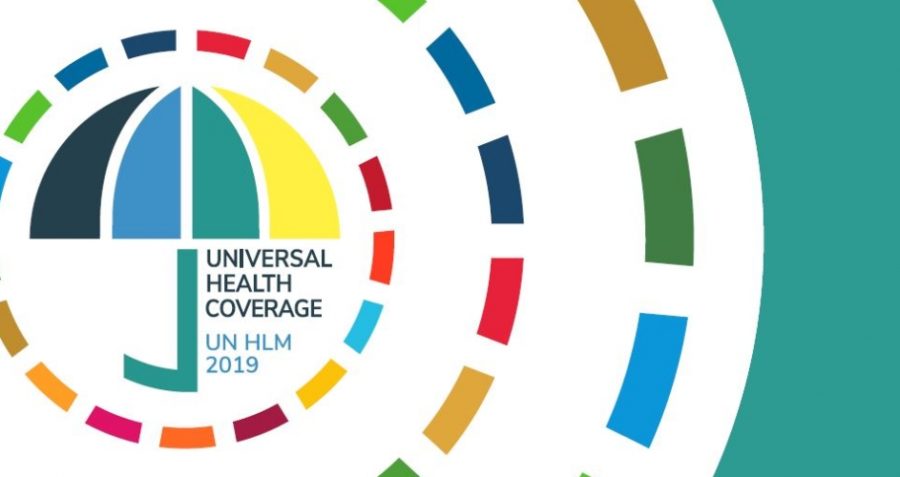Does the UN’s Universal Health Coverage declaration fail the most vulnerable people?

Following this week’s High Level Meeting on Universal Health Coverage (UHC) in New York, Seb Rowlands tells us why the political declaration didn’t go far enough for the people most affected by HIV.
This week UN member states convened at the UN high-level meeting on universal health coverage to agree a political declaration and discuss ways forward towards reaching UHC for all.
Frontline AIDS, in partnership with the Global Network of People Living with HIV, International Civil Society Support and our Partnership to Inspire, Transform and Connect the HIV Response (PITCH) partners, have been pushing for the inclusion of the most marginalised within this declaration, and for strong commitments for people living with, and most affected by HIV.
The positives
We welcomed the declaration’s three references to HIV/AIDS, and recognition of the need to support people living with HIV/AIDS in particular, as well as mentions of the additional barriers faced by marginalised and vulnerable groups.
We had pushed for explicit references to key populations (gay men and men who have sex with men, transgender people, sex workers, people who use drugs and adolescent girls and young women), without success. However we’re happy that there is explicit mention of the impacts that stigma and discrimination have on people who are (as the declaration puts it) “vulnerable or in vulnerable situations”.
Strong support for sexual and reproductive health and rights (despite opposition)
Throughout the negotiations on the political declaration there had been resistance from conservative governments against the inclusion of progressive language on sexual and reproductive health and rights (SRHR). Led by the US, a group of 19 governments, issued a statement against the inclusion of sexual and reproductive rights. In response, a much larger group of over 50 supportive governments, issued a strong counter statement in support of comprehensive SRHR and continued to push for the rights of adolescent girls, women and the most marginalised.
Discussions during the high-level meeting revealed continued support for SRHR and particularly for sexual and reproductive rights, which is missing from the political declaration. For example, the UK government made a pledge to spend £600 million on a new program for reproductive health supplies.
The negatives..no mention of key populations
Key populations were definitely not on the radar at the UHC HLM. Though a handful of statements made reference to the barriers presented by stigma and discrimination, nowhere was there explicit mention of key populations who experience them, nor were key population groups including sex workers or people who use drugs visible at the meeting.
Peter Sands, the Executive Director of the Global Fund, spoke of the Fund’s work in supporting policy changes to challenge the marginalisation of criminalised groups, but he was the exception.
The declaration made no mention of the impact that criminalisation has on health, and this is disappointing. As long as people’s identities and/or behaviours are criminalised (such as homosexuality, sex work, drug use), UHC will never be truly universal.
No space for civil society voices
There’s a disappointing lack of recognition of the critical role that communities and civil society can play in the design and implementation of UHC. This was evident in multi-stakeholder panels, which were intended as spaces for open discussion between civil society, the private sector, member states and academia. In reality, we saw panels of pre-selected individuals and organisations chosen in a non-transparent process.
Member states were given priority to make their statements, which were mostly self-congratulatory examples of their successes. When the floor opened to other stakeholders, these were institutions such as the Global Fund, UN bodies and UHC2030. At no time were smaller civil society groups able to make interventions. It is disappointing that the voices of communities and advocates on the frontline of delivering HIV and other health services were not deemed worth listening to. Promises of inclusive consultation proved to be tokenistic.
What about accountability?
The declaration may be criticised for its lack of an accountability framework or targets. It certainly raises some questions: how will progress be defined and tracked? How will the broad goals of the declaration translate into a concrete package of services?
So what happens next?
The declaration is not the rallying cry we hoped for and it doesn’t uphold the right to health for the most marginalised. But it marks a starting point at the global level and allows us to move the discussion onto implementation and concrete steps towards realising UHC. Moreover, the fact we have a political declaration, following endless rounds of discussion and pushback on progressive language, is an achievement in itself.
Now comes the truly hard work. Civil society organisations need to work together, both to define what accountability looks like, and to demand it. The HLM was an important moment for HIV and health advocates, but now the focus needs to return to national and even local level advocacy, rather than global spaces.
For Frontline AIDS, there remains one absolute essential – putting ‘the last mile first’ is the only way to achieve full UHC and the 2030 Agenda for Sustainable Development, and ensure vulnerable people are not left behind.
The Partnership to Inspire, Transform and Connect the HIV response (PITCH) is a joint partnership between Frontline AIDS, Aidsfonds and the Dutch Ministry of Foreign Affairs.
Tags
HIV preventionPeople who are marginalisedPITCHUniversal Health Coverage (UHC)

